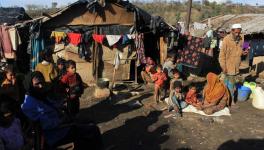Rohingya Woman Deported to Myanmar by Indian Authorities is in Grave Danger, Says HRW
A Rohingya woman who was separated from her family and deported to Myanmar by the Indian government on March 22, 2022, is in danger, as per Human Rights Watch. The government's decision to send her back violates the international law that "prohibits the forced return of refugees to places where their lives or freedom would be threatened."
The case involves 36-year-old Hasina Begum, who, with her husband and three children, is registered with the United Nations High Commissioner for Refugees (UNHCR) as a refugee and was detained by Jammu and Kashmir authorities on March 6, 2021, as part of a verification process. Her husband, Ali Johar, informed Human Rights Watch that the family "have not seen her since she was detained over a year ago."
"The Indian government gains nothing by forcibly returning a Rohingya woman to Myanmar while she is separated from her children and put at grave risk," said Meenakshi Ganguly, South Asia director at Human Rights Watch. "The government's decision to expel Rohingya refugees despite mountains of evidence that their lives and freedoms would be at risk in Myanmar shows cruel disregard for human life and international law."
Rohingya Muslim refugees in India have been subjected to vitriolic hate and violent attacks, often incited by groups close to the ruling regime. As per the UNHCR, at least 240 Rohingya are currently detained in the country "on charges of illegal entry" in two locations in Delhi and Jammu.
In total, 40,000 Rohingya are currently living in India, of which 20,000 are registered with UNHCR. The deportation exercise from the Indian government started in October 2018 with 12 Rohingya deported back to Myanmar. The government at the time had claimed that these refugees left voluntarily.
In Begum's case, the authorities deported her despite Manipur State Human Rights Commission putting the deportation on hold on March 21, 2022. The commission, in its order, had noted that "the plan to deport her appeared on its face to violate the right to life and personal liberty guaranteed by the Indian constitution and article 14 of the Universal Declaration of Human Rights, as well as the principle of nonrefoulement, or nonreturn."
About 600,000 Rohingya are currently confined to camps and villages in Myanmar's Rakhine State. Since February 2021, the military leadership has worsened the restrictions and other abuses. UN special rapporteur on Myanmar had reported in December 2021 that "conditions for the safe, sustainable, dignified return of the Rohingya to their homeland currently do not exist." Despite this, the Indian government have not gone back on its policy of deporting Rohingya who are travelling without "valid travel documents required under the Foreigners Act."
Human Rights Watch said that "the Indian government should halt the deportation of all Rohingya to Myanmar because of the serious risk they face of persecution", adding that "Indian authorities should provide anyone at risk of deportation with the opportunity to see a lawyer, to meet with UNHCR, and to present their arguments against deportation before an impartial adjudicator. The authorities should prohibit any deportation that amounts to refoulement."
Get the latest reports & analysis with people's perspective on Protests, movements & deep analytical videos, discussions of the current affairs in your Telegram app. Subscribe to NewsClick's Telegram channel & get Real-Time updates on stories, as they get published on our website.
























